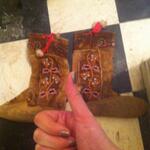I received a very encouraging message from the rabble.ca team that is heading up this year’s annual Vegan challenge.
I have written an article for this year’s Vegan Challenge titled The Indigenous fight against colonial veganism which explores different culture’s connection to nutrition and the politics of food and more importantly, the acquisition of food.
The email message I received was from a vegan who supports the seal hunt, as “there needs to be a shame-free industry for the hunt to be profitable for indigenous communities) and really sees a lot of what you wrote about within vegan communities (the dismissive nature and sometimes just blatant racism)…”
The issue of the Canadian seal hunt has been in the news recently thanks to spouting off of famous Hollywood types and the Twitter hashtag backlash.
Let me explain…
As everyone has a right to, Ellen DeGeneres’ made her opinion of the seal hunt that occurs every year (and has occurred in Inuit communities since time began) known in her choice of supporting the U.S. Humane Society.
The American Humane Society has been a staunch opponent of the seal hunt — an often misunderstood (with little effort to correct any misconceptions of the hunt and the underlying colonalism and racism) practice that appeals as low hanging fruit does — with wild rumours that betray the actual ethics behind the hunt and the communities that participate.
In this case, I am speaking of Northern Indigenous communities that have hunted seals in an ethical and sustainable way since time began.
This whole issue started over her now-famous Oscar #selfie, but that’s another story for another time.
On her website, she said: “Seal hunting is one of the most atrocious and inhumane acts against animals allowed by any government. Canada is allowing the slaughter of a record number of seals in their 2011 hunting season, which is going on right now. The seals are often younger than 3 months old.”
There is so much misinformation about the seal hunt I can’t write it all down, but I suggest you check out this link by the Government of Canada and this link by the Canadian Sealers Association.
For example, take the myth that the “Canadian government allows sealers to kill whitecoat seals. When in reality the image of the whitecoat harp seal is used prominently by seal hunt opponents. This image gives the false impression that vulnerable seal pups are targeted by sealers during the commercial hunt.
The hunting of harp seal pups (whitecoats) and hooded seal pups (bluebacks) is illegal – and has been since 1987. Marine Mammal Regulations prohibit the trade, sale or barter of the fur of these pups. Furthermore, adult seals cannot be harvested when they are in breeding or birthing grounds and younger seals must be weaned, self-reliant and independent.”
The Northern Indigenous communities and their allies quickly rallied around those who participate in the seal hunt through a series of #sealfies — pictures of people proudly wearing seal skin clothing and pieces of art. This includes a portrait of DeGeneres’ herself on a piece of seal skin.
Artist Rodney Mercer from Corner Brook told CBC News that “he wanted to depict how Canadians use seal products while protesting celebrities who oppose the hunt.”
This wave of #sealfies were from people like me who won’t be belittled or guilt-tripped for supporting the ethical, sustainable Indigenous seal hunt.
On Twitter, I posted a picture of my seal and reindeer skin, beaded by hand mukluks.
The Twitter protests were started by artists like Alethea Arnaquq-Baril, an Inuk filmmaker from Iqaluit, Nunavut. Her Tweet read, “@TheEllenShow I am an Inuit seal meat eater, and my fur is ethical, humane. #sealfie vs. #selfie”
Meanwhile, in an interview with QMI Agency, Inuk seamstress Sandi Vincent challenged DeGeneres’s assertion that hunting seals is “inhumane.”
“In Inuit culture, it is believed seals and other animals have souls and offer themselves to you. Humanely and with gratitude we accepted this gift,” she said.



